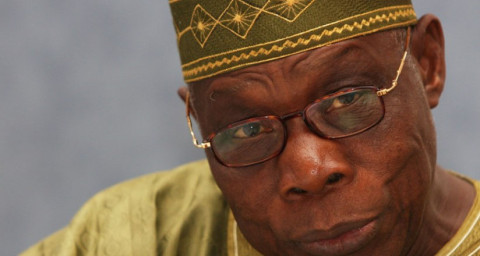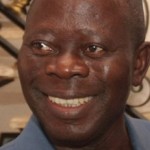OPINION: PDP, Obasanjo and Hubris, By Sufuyan Ojeifo
Articles/Opinion, Featured, Featured Contributors/Columnists, Latest Headlines Wednesday, March 8th, 2017
(AFRICAN EXAMINER) – Let me state from the outset that I am not a card-carrying member of the Peoples Democratic Party (PDP), but I have sympathy for the party for some personal reasons. With that kind of sympathetic or empathic mindset, it becomes difficult to maintain a dispassionate position – privately or publicly- when matters in issue have direct or indirect bearing or reference to the PDP.
It was against this backdrop and within this context that I was filled with righteous indignation when I read media reports last weekend wherein former President Olusegun Obasanjo was thumbing his chest in self-congratulations on how he and his friend, Senator Ahmadu Alli, whom he imposed on the PDP as national chairman in 2005, orchestrated the sinking of the party by their exit from the party.
As one of the political reporters who covered the activities that presaged the formation of the PDP in 1998, I remember, somewhat, the roles that the founding fathers played. I remember the series of preparatory meetings in Professor Jerry Gana’s house. I remember that committees were set up to handle different aspects of the party formation.
I also remember the series of constitution drafting committee meetings in the residence of the late Chief Sunday Awoniyi. I remember that the late Chief Bola Ige was the chair of the constitution drafting committee and how he withdrew from the committee, claiming that he sighted some “Abacha politicians” at one of the enlarged meetings where final decisions were to be made.
I remember that, in the course of the hurried preparations to beat INEC deadline, Bola Ige and his Afenifere associates withdrew from the process. Consequent upon his withdrawal to register Alliance for Democracy (AD), the PDP had to rejig the committee and the task of steering the constitution drafting committee fell squarely on the shoulders of General David Jemibewon (retd), who is a lawyer.
I remember the role played by the second republic vice president, Dr Alex Ekwueme, who was chairing the meetings of the entire association until the point of registration when he had to withdraw because of his presidential ambition. I remember that it was the last day of the submission of party registration documents to the INEC that the PDP, at the Rockview Hotel, Abuja, selected the late Chief Solomon Daushep Lar as the acting National Chairman and other interim officers whose names were submitted to INEC.
I remember that when the jostle for the presidential ticket started, the man who became the eventual winner of the ticket, former head of state, General Olusegun Obasanjo, had just been granted presidential pardon and released from prison where the Abacha regime had sent him on life imprisonment for alleged involvement in a phantom coup.
I remember that the choice of Obasanjo, who did not participate in the formation of the PDP -note also that he was not a politician- was orchestrated by the military hegemony of the then incumbent head of state, General Abdusalami Abubakar, as part of the grand plan to pacify the southwest zone for the death of Chief MKO Abiola in the custody of the federal government with his June 12, 1993 presidential mandate.
The three parties-PDP, AD and All People’s Party (APP), which formed an alliance with the AD for the presidential election, all presented Yoruba presidential candidates. AD-APP alliance presented Chief Olu Falae with the late Umaru Shinkafi as running mate. The decision to produce Obasanjo, as PDP’s candidate, was deliberately guided to further the influence of the military in democratic governance.
The decision had the imprimatur of the troika of former military president, General Ibrahim Babangida, former chief of army staff who later became minister of defence in Obasanjo’s government, General Theophilus Yakubu Danjuma and former chief of army staff who served as national security adviser in Obasanjo’s government and later in Goodluck Jonathan’s administration, General Aliyu Gusau. The troika largely funded Obasanjo’s election, even though sundry funding and support came from other sources.
I remember that immediately Obasanjo, who did not know how the PDP was formed, who did not have money to spend on the election, became president on May 29, 1999, he decided to run the PDP his own way. In the November 19 and 20, 2000 national convention of the party, he ensured that the popular candidate-Chief S.B. Awoniyi-was rigged out at the Eagle Square. He purportedly deployed state machinery to impose his candidate-Barnabas Gemade- as chairman of the party.
When Gemade was perceived to be too close to the state governors and was no longer trusted to support him completely, Obasanjo replaced him with Audu Ogbeh and when Ogbeh outplayed his hands and seemed to be gravitating towards vice president Atiku Abubakar in opposing the hijack of the party by the president, he (Ogbeh) who had condemned the failed plot by Chris Uba to kidnap and force Chris Ngige to resign as governor of Anambra, bit the bullet that torpedoed him from the chair of the party. He was forced to resign.
Then entered Obasanjo’s man Friday: Senator Ahmadu Ali-a retired army colonel- with whom Obasanjo plotted unsuccessfully to push through his third term agenda. Remember Ali was Obasanjo’s federal commissioner of education under whom the famous “Ali-must-go” students’ riot that paralysed educational activities in higher institutions took place in 1978.
I cannot remember anything that was unique under Ali’s national chairmanship of the PDP, except two things: the political empowerment of his wife, Maryam, with appointment(s) and the failed third term agenda of Obasanjo. Yet, at a symposium in Abeokuta to mark his 80th birthday, Obasanjo, in his moment of hubris, told journalists that the exit of himself and Ali from the PDP marked the beginning of the sinking of the party.
Respectfully, that was not the correct position. The PDP actually began to sink during Obasanjo’s presidency. The party was buckling under his leadership as he virtually privatised it. Those who knew how to run party were not allowed to call on their experience in the second and third republics and thus the party was denied of abundant savvy within. He denied the party the integrity capital and the party administration capacity of third republic senator, the late S.B. Awoniyi, the Sardauna Keremi and former chair of Arewa Consultative Forum (ACF).
Obasanjo succeeded in subjugating the party, intimidating the National Assembly and browbeating influential leaders of the government and party. He became the emperor and the lord of the manor. He deployed the anti-graft agencies to harass political opponents within and outside the PDP. But for the entire nation, he would have pushed through his third term agenda. And because of the failure of the project, some prominent politicians had their plans for higher offices within the PDP truncated. It was a case of “you stopped me; I stopped you.”
Indeed, what is seen as the sinking of the PDP by Obasanjo is really not the apt interpretation of what is happening to the party. The PDP is just passing through a phase, even though people like former national secretary of the party, Vincent Ogbulafor and one or two other leaders, had predicted that the PDP would rule Nigeria for unbroken 60 years. Its rule was, however, terminated after 16 years! Now, the destination the PDP is headed may not be clear, but there must be an arrival. Well-meaning members of the party are concerned and hopeful, regardless of the lingering conundrum in which it has found itself, that the party would arrive safely.
Therefore, claiming and rejoicing that his and Ali’s withdrawal from the party marked the beginning of PDP’s woes represent a sad commentary on the kind of lesson younger generations should learn from a statesman and influential leader of his people in the mold of Obasanjo. What would make a leader rejoice over the collapse of a platform on which he was president for eight years, chairman of its Board of Trustees for five years and by virtue of which he has remained the greatest political beneficiary of the current fourth republic governance?
No man is God and therefore no man can be in eternal control of his environment. Obasanjo should know that the only thing that is permanent in life is change. Therefore, political leaders and statesmen should be circumspect, moderate their reactions or measure their utterances and, above all, learn to tame hubris, lest they be accused of playing God. Besides, such comments as attributed to Obasanjo, only succeeded in diminishing him and making people to view him as indulging in a pastime of petty political brickbats which is not statesmanlike.
Mr Ojeifo, journalist and publisher, sent this piece via ojwonderngr@yahoo.com
Related Posts
Short URL: https://www.africanexaminer.com/?p=38300






















